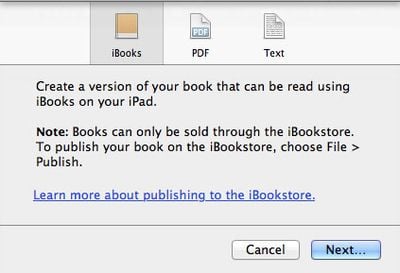Earlier today we published a story about iBook Author's exclusivity clause which generated some confusion. To clarify, Apple is not claiming exclusive sales rights to the content of published textbooks but to the specific output format (iBooks) generated by their iBooks Author tool.
Today, Apple released an easy to use tool called iBooks Author which allows anyone (publishers and users) to create interactive iBooks with text, video, images and more. As Apple mentioned during their media event, the availability of such a robust tool to make electronic books has been lacking. iBook Author can export projects in a number of different formats, including iBook format, PDF and text.

The iBooks (version 2) format is an improved format created by Apple based on ePub 3, but with additions and changes specific to Apple. These additions are believed to add new functionality and interactivity to the format as shown during today's media event.
At present, this iBook format will only work with Apple's iOS devices, and will not work on other devices. Even so, Apple has restricted sales of any iBook formatted documents coming from iBooks Author to the App Store. VenomousPorridge comes out against these terms suggesting that trying to control the output format is overreaching and falls apart in certain cases:
Or how about this: for a moment I’ll stipulate that Apple’s EULA is valid and I’ve agreed to it implicitly by using the software. Now suppose I create an iBook and give it to someone else who has never downloaded iBooks Author and is not party to the EULA, and that person sells it on their own website. What happens now?
As John Gruber points out, beyond the 30% App Store cut, Apple may simply not want to feed content to competing bookstores such as Amazon or Google.
Second, it’s about not wanting iBooks Author to serve as an authoring tool for competing bookstores like Amazon’s or Google’s. The output of iBooks Author is, as far as I can tell, HTML5 — pretty much ePub 3 with whatever nonstandard liberties Apple saw fit to take in order to achieve the results they wanted.
As we've mentioned, as a new format, the iBook format isn't even compatible with any other devices, but it's easy to imagine that compatibility could be implemented by Google or Amazon if the format takes off. Apple achieved a similar lock-in advantage with their own App Store apps, though those apps can't run on competitors' devices due to technical issue rather than licensing ones.
As for the likelihood of publisher adoption, AllThingsD points out why publishers are willing to start selling textbooks at the $15 price point when their paper counterparts go for much higher. According to the McGraw-Hill CEO, the company expects to make up the sales on volume. At least in the high school market, McGraw-Hill tends to sell $75 texts to schools which keeps those books for an average of 5 years. At $15 and sold directly to students, the company anticipates recurring annual revenue from each year's students.
Not everyone seems convinced, however, and Apple's proprietary format is raised as a possible issue. Macworld spoke with an executive at Houghton Mifflin Harcourt who claims that they need to be device-agnostic in order to support a broad number of devices.






















